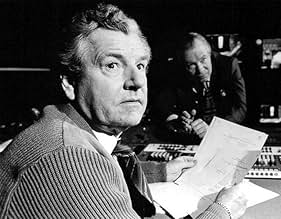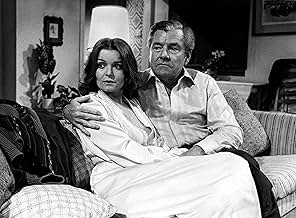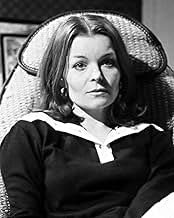Reino Unido ocupado por Alemania, Peter descubre que su pareja es parte de la resistencia judía. ¿Se unirá a derrocar a los nazis?Reino Unido ocupado por Alemania, Peter descubre que su pareja es parte de la resistencia judía. ¿Se unirá a derrocar a los nazis?Reino Unido ocupado por Alemania, Peter descubre que su pareja es parte de la resistencia judía. ¿Se unirá a derrocar a los nazis?
Opiniones destacadas
I saw this series in 1978 and have remembered it ever since. The plot was subtle, not at all affected; the acting was good, the series engaging. The premise was plausible - Germany invaded the UK successfully in 1940 and Nazism dominated Europe ever since. It is obvious from the conversations that Germany probably did not invade the Soviet Union, that the USA did not become involved in Europe, that a Nazi Germany survived into the 1970s and dominated Europe in the same way that in real history the Soviet Union dominated the Warsaw Pact - not outright occupation of all areas but control and influence. The characters behaved as if they had been living for nearly forty years in a 'European Union' which was in actuality a Nazi-dominated Germanic/'aryan' empire. But nothing about the setting was extreme, outwardly in physical terms the UK looked like the 1970s UK actually did. What was different was the cultural and political background. In many ways the UK was materially better off than we felt it to be in 1978 - in one scene a lead character says, ironically, something like: 'Law and order, no strikes, good jobs, full employment and a good pension when you retire. Its not a bad life under the Germans, eh?' The badness was under the surface of this materially wealthy totalitarian state. This holds lessons for today. I recommend this series very highly.
10mrosey23
Of course you can tell that I like An Englishman's Castle. Although it was 30 years ago when I saw it for the first and last time, I remember clearly how the story evolved into a story not about 1940 nor even about 1978 in England but more it became a study of how people are ruled, and how they rebel, and how they live and how they love. Intertwined with all of this is a study of how censorship is really conducted in the modern world of media. Since it was aired on PBS (WNET) in New York it achieved an almost eerie obscurity which I've always felt had to do with how on-the-money were its views of censorship. Its obscurity is a testimony to the truth that was written into every aspect of this wonderful production.
As this three-episode story begins, English TV producer Peter Ingram (Kenneth More) is preparing the next group of stories in his long-running series, "An Englishman's Castle." A nostalgic wartime series, it tells the story of a British family living through the "Phony War" and the "Lightning War" (blitzkrieg) of the first year of World War II, with the fall of Poland, the fall of France ... and the fall of Britain ... to Nazi Germany... 38 years ago.
The series is a popular part of British television. The German Gestapo's watchdogs do not mind it: they approve of patriotic sentiment, so long as it does not turn anti-German. And Ingram has played this game for a very long time, all of his adult life. He is prepared to continue playing it. Until the day comes when the British Resistance approaches him for help...
I liked the basic story itself, but I especially liked the depiction of the "show within a show". The series's musical signature was a stately orchestral "Lilibulero", giving it the same "sound" as the long-running series "Upstairs, Downstairs" -- which also depicted life during a time of turbulent change in Britain. ("Lilibulero" also happens to be the musical signature of the real-world World Service radio program that is broadcast by the BBC, the British production company that aired this television show.) It was interesting to see how an "Upstairs, Downstairs"-like show might have looked if Britain had not continued to win European wars in the 20th century.
One especially striking moment took place during the first rehearsal of an upcoming episode of the series. Ingram was basing the series on his own life during those years ... and in his own life his older brother was in the British military and was killed. The TV character corresponding to his brother was very popular with the British audience, and the actor playing him expected to have a cozy, secure job for quite a few more seasons. When Ingram passed out the next week's script and the cast seated around the large table read through them, everyone was stunned when they learned that in this episode that very popular character was killed. Truly killed ... not the "he's missing and presumed dead" "killed" that soap operas sometimes use to bring a character back on a whim. Killed-dead.
The entire cast protested. The actor protested, of course, but the others protested out of sympathy for him. This was more than simply a role, they argued, it was his livelihood, his income. How could you, in effect, sack him, when he had done nothing wrong ... when he had done nothing to deserve this cruel treatment? But Ingram's brother had done nothing to deserve being killed, either. Yet he died ... and so, Ingram explained, the time had come for this character to die.
We see many stories set "backstage". We don't often see this aspect of "backstage life" for working actors. Although I believe it had no significant effect on the overall story (the Gestapo and the British Resistance), it was a television moment that has stayed with me for more than 20 years (I write this in 2004). I remember this show fondly.
The series is a popular part of British television. The German Gestapo's watchdogs do not mind it: they approve of patriotic sentiment, so long as it does not turn anti-German. And Ingram has played this game for a very long time, all of his adult life. He is prepared to continue playing it. Until the day comes when the British Resistance approaches him for help...
I liked the basic story itself, but I especially liked the depiction of the "show within a show". The series's musical signature was a stately orchestral "Lilibulero", giving it the same "sound" as the long-running series "Upstairs, Downstairs" -- which also depicted life during a time of turbulent change in Britain. ("Lilibulero" also happens to be the musical signature of the real-world World Service radio program that is broadcast by the BBC, the British production company that aired this television show.) It was interesting to see how an "Upstairs, Downstairs"-like show might have looked if Britain had not continued to win European wars in the 20th century.
One especially striking moment took place during the first rehearsal of an upcoming episode of the series. Ingram was basing the series on his own life during those years ... and in his own life his older brother was in the British military and was killed. The TV character corresponding to his brother was very popular with the British audience, and the actor playing him expected to have a cozy, secure job for quite a few more seasons. When Ingram passed out the next week's script and the cast seated around the large table read through them, everyone was stunned when they learned that in this episode that very popular character was killed. Truly killed ... not the "he's missing and presumed dead" "killed" that soap operas sometimes use to bring a character back on a whim. Killed-dead.
The entire cast protested. The actor protested, of course, but the others protested out of sympathy for him. This was more than simply a role, they argued, it was his livelihood, his income. How could you, in effect, sack him, when he had done nothing wrong ... when he had done nothing to deserve this cruel treatment? But Ingram's brother had done nothing to deserve being killed, either. Yet he died ... and so, Ingram explained, the time had come for this character to die.
We see many stories set "backstage". We don't often see this aspect of "backstage life" for working actors. Although I believe it had no significant effect on the overall story (the Gestapo and the British Resistance), it was a television moment that has stayed with me for more than 20 years (I write this in 2004). I remember this show fondly.
I can't add to the excellent comments made previously. On a whim, I checked this title on IMDb tonight and was surprised to find it listed.
I also watched An Englishman's Castle, on PBS/Harrisburg, while living in New Holland, PA in the late 1970s. I became increasingly involved and moved by the first two episodes. When the night arrived for episode 3, the station announced "An Englishman's Castle will not be shown tonight." It was never re-scheduled. I have never seen the series listed anywhere since. For decades, I have been wondering if this were intentional; there never was a third and final episode, and this was a part of the main plot. I see today there was a third installment. But I'm still wondering why this outstanding BBC production hasn't been re-broadcast (to my knowledge), and I can't even find it on Amazon.com
I also watched An Englishman's Castle, on PBS/Harrisburg, while living in New Holland, PA in the late 1970s. I became increasingly involved and moved by the first two episodes. When the night arrived for episode 3, the station announced "An Englishman's Castle will not be shown tonight." It was never re-scheduled. I have never seen the series listed anywhere since. For decades, I have been wondering if this were intentional; there never was a third and final episode, and this was a part of the main plot. I see today there was a third installment. But I'm still wondering why this outstanding BBC production hasn't been re-broadcast (to my knowledge), and I can't even find it on Amazon.com
Selecciones populares
Inicia sesión para calificar y agrega a la lista de videos para obtener recomendaciones personalizadas
- How many seasons does An Englishman's Castle have?Con tecnología de Alexa
Detalles
Contribuir a esta página
Sugiere una edición o agrega el contenido que falta

Principales brechas de datos
By what name was An Englishman's Castle (1978) officially released in Canada in English?
Responda




























